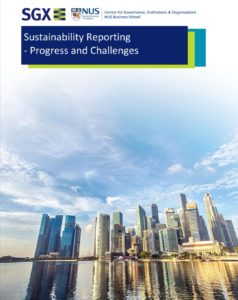
The Singapore Exchange (SGX) and the Centre for Governance, Institutions and Organisations (CGIO) at the NUS Business School recently published a study report on “Sustainability Reporting – Progress and Challenges“. The study reviewed the sustainability reporting performance of Singapore-listed companies after SGX mandated a new listing rule in 2016, which required listed companies to issue an annual sustainability report.
The study showed that almost all listed companies (495 companies) have produced their sustainability reports on a timely basis following the mandating of the requirement. About 80% of the companies reported for the first time. The real estate, health care and communication services sectors produced the best-quality reports, and Mainboard and Catalist-listed companies produced reports that were of similar quality.
Here are 3 important takeaways from the study report:
1. Most companies are not considering the implications of climate change
From the sustainability reports submitted by companies, most of the material environmental, social and governance (ESG) factors were related to environmental and social aspects. Occupational health and safety issue was prioritised as material by 319 (64%) companies, followed by code of ethics, energy, economic performance, and training and education.
Climate change was mentioned as material in only 32 sustainability reports despite its potentially huge impact on island states like Singapore and industries such as insurance, banking and agri-commodities. The study highlighted that listed companies should prepare themselves for better climate adaption and economic resilience by considering climate change as their material topic, and to analyse the financial implications of climate change on their own business models.
2. The consultation process with stakeholder groups can be improved
The study highlighted that the consultation process with stakeholder groups during materiality identification can be improved. Some companies stated that they had considered impacts on stakeholders as one of their selection criteria, without substantial evidence of stakeholder consultation. Companies need real feedback from key stakeholder groups to reduce information bias in their materiality assessment.
More companies engaged internal stakeholders, which could be attributed to the ease and accessibility of engaging this group. However, opinions from external stakeholders should be included as well.
3. Companies need to disclose both favourable and unfavourable aspects in their sustainability reports
The study highlighted that while all companies disclosed favourable aspects in their sustainability reports, only about 55% disclosed unfavourable aspects. Some disclosed unfavourable aspects were workplace injury rates, loss of productivity in the workplace and fines for non-compliance with regulatory requirements and failure to meet previously set targets.
Only 26% of 495 listed companies disclosed both positive and negative trends of performance over time in their sustainbility reports. Some examples of a negative trend of performance included increasing water consumption per capita and increasing carbon emission intensity.
SGX recommends that listed companies disclose unfavourable aspects in addition to the usual disclosures on favourable aspects, so as to give the sustainability report an accurate and balanced view. By presenting both positive and negative aspects of their sustainability management, companies can enhance accountability for results, which will boost investors’ confidence.
When your company produces the next sustainability report, remember to consider the above 3 points to improve the report.
Source and image credit: SGX and CGIO, Sustainability Reporting – Progress and Challenges
